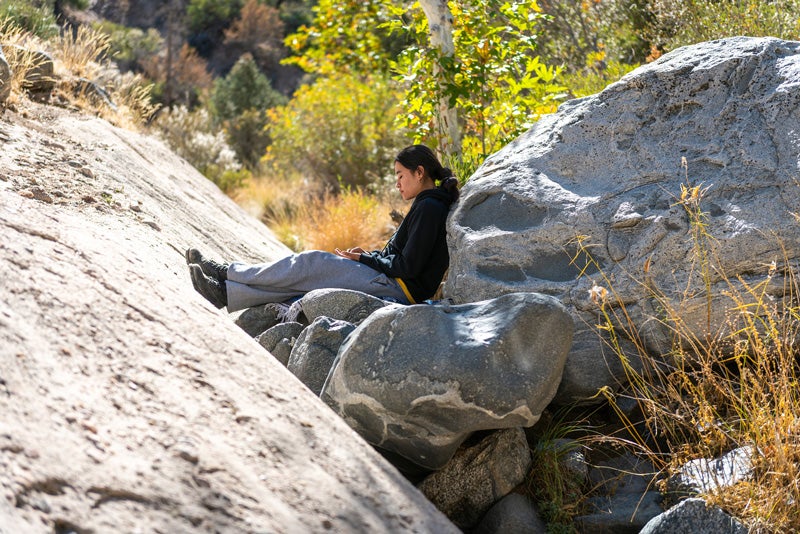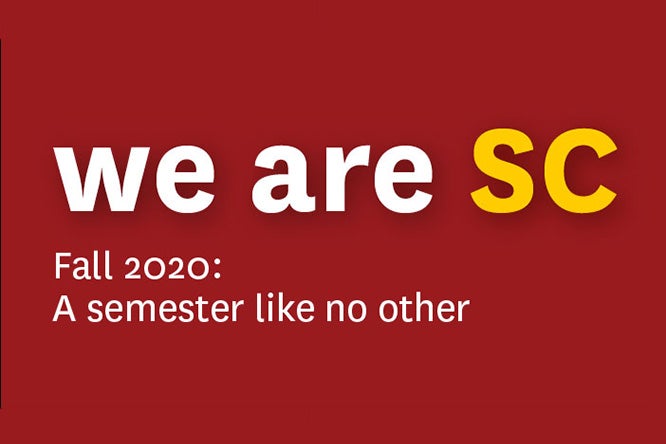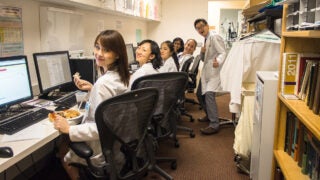How to Heal the College Student’s Soul During Upheaval: Connection
Varun Soni, dean of USC’s Office of Religious and Spiritual Life, describes how the USC community can come together and find contentment in a time of turmoil.
Faced with a pandemic, political strife and the everyday stresses of life as a young adult, many USC students — and college students nationwide — feel overwhelmed.
Varun Soni has a few suggestions.
As the dean of USC’s Office of Religious and Spiritual Life and vice provost of campus wellness and crisis intervention, he draws on decades of experience examining the big questions of life. Here, he shares his insights on coping with COVID-19, connecting with others, creating a USC spiritual community and finding inner joy (with some light editing for clarity and brevity).
Amid societal discord and a global pandemic, how can a spiritual community provide comfort?
In times of crisis and anxiety, people often turn to either their religious traditions or their communities of care and support. At USC, we’ve seen a huge upsurge in online participation in our religious and spiritual services, but also in our mindfulness classes and our sleep classes. We have a class, called CLICK, about healthy relationships. We’re going to continue to offer a lot of courses and workshops online, from mindfulness to sleep to self-compassion.
I think the challenge here is that so much of what we do as a university is about being together. When we do research in labs, we come together. As part of a residential community, we live together. As part of a university that has a great athletic tradition, we watch sports together, we gather together. University is predicated on gathering in the same way that religion is predicated on gathering.
So much of what religion is about is coming together; supporting each other through ritual, through pilgrimage, through congregational singing, through service to each other.
So much of what religion is about is coming together; supporting each other through ritual, through pilgrimage, through congregational singing, through service to each other. In this age of COVID, we’re apart, and we’re not programmed to be apart. It’s not in our DNA. We’re social beings, we’re tribal people.
So, I think the hardest part in all of this is that at a time of anxiety, when one’s natural inclination is to be with each other, we’re not able to be with each other, and that just exacerbates the anxiety that we may already be feeling. We’re going to have to reimagine what it means to be in a community of care and compassion and support, even as we’re socially distancing.
What about people who don’t have a spiritual community?
Even pre-COVID, I’ve seen an epidemic of loneliness on our campus over the last several years. As students were more and more connected online, they felt more disconnected with each other. I believe that students are already struggling to find a sense of community and to feel like they belong on a campus like USC, because it’s a big campus in a big city. And I think those challenges are only going to increase now that we’re in this new space.
When students had to leave in the spring, I know that was really tough for them. It wasn’t just tough to move on to a Zoom platform, it was also tough for them not to go through the rituals and rites of college life — not to be together for graduation, not to wind the year down together, not to do the late-night sessions, not to be able to properly say goodbye to the people they cared about.
But I think that any community can be a spiritual community. When I got to USC, people were like, “Oh, you’re the dean of religious life. You should know that the real religion here is football.” And then when I went to a football game, I was like, “Oh yeah, they weren’t kidding!” This is the Coliseum, and it’s a pilgrimage, people have rituals and superstitions, it’s an intergenerational transmission of values and mythology. So, I think any community can be a spiritual community. It could be the chess club, it could be the surf club, it could be your innovation lab, it could be your research group.
How do you ensure students feel supported?
I try to make a big place feel small. I try to make a place like USC feel intimate, so that students feel like they have a tribe, that they’re connected and that they belong.
In the age of social media, our students are often comparing their real-world experiences with the curated Instagram lives of others, and then they don’t feel like they belong or that everyone’s figured it out but them. Then they feel like imposters on campus. So, part of what I try to do is make everyone talk to everyone about how actually they do belong and that this is their place.
The second thing I try to do is redefine success. When students come in, they have a specific version of what success looks like. But I want student success to include thriving, flourishing, relationships, courage, joy, compassion. Things you might not put on a resume, but things that fundamentally changed who you are and how you live. Oftentimes, students will put things on a resume to impress others, but I want them to impress themselves. I want them to have their own metrics of success, too — not just the hoops that the world tells them to jump through.
How can spirituality help us find joy?
Spirituality allows us to transform ourselves: self-growth, self-transformation, self-awareness, self-reflection.

So much of what we learn in the university is how we transform the world, but spirituality tells us that we transform the world by transforming ourselves, that we also have to do inner work, not just outer work, and that actually we have more control over what’s happening inside of us than we have in what’s happening around us. So if all individuals are transformed, then the world is transformed. I think spirituality gives us the tools, techniques, and perspectives to do that inner work. Sadhguru calls it “inner engineering.”
Too often in our society, we’re told that the answers to all our questions or the remedies to all our problems lie outside of us. That if we have the right job, if we marry the right person, if we have the right degree, and especially in the U.S., if we buy the right stuff, then we’ll be happy. And if, somehow, we’re not able to be happy even if we do all that, then there’s something wrong with us, obviously.
But I think spirituality gives us a different approach and allows us to think that the things that can bring us the kind of contentment that we seek as human beings are the things that we actually control. Who we hang out with, what our values are, how is our health, how often we tell people we care about them, how we’re in the service of the greater whole, how do we find beauty and joy — those are things that are within our control, that actually fundamentally shape who we are and how we act and move in the world.




